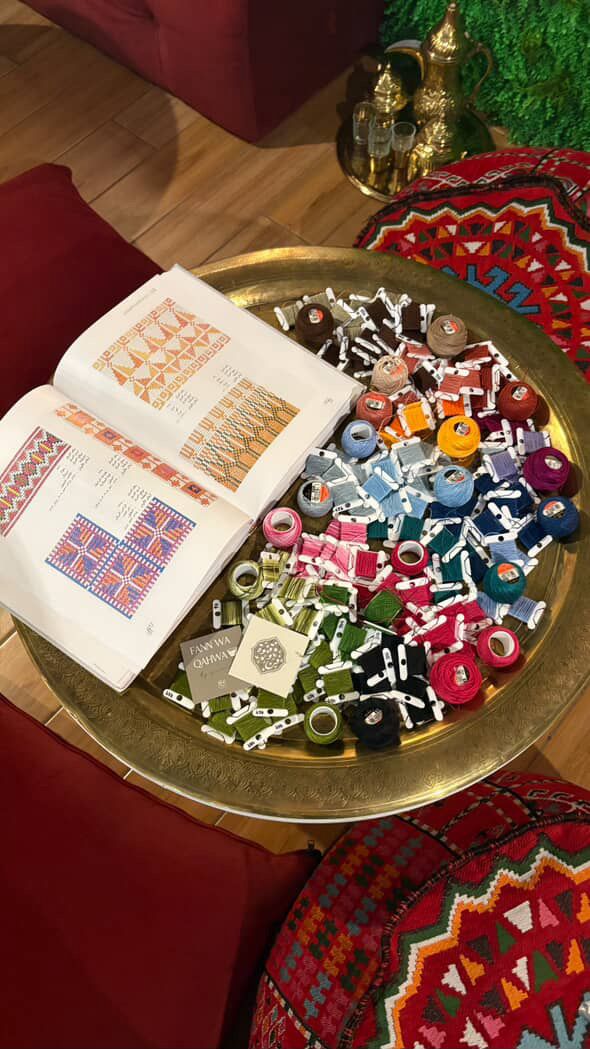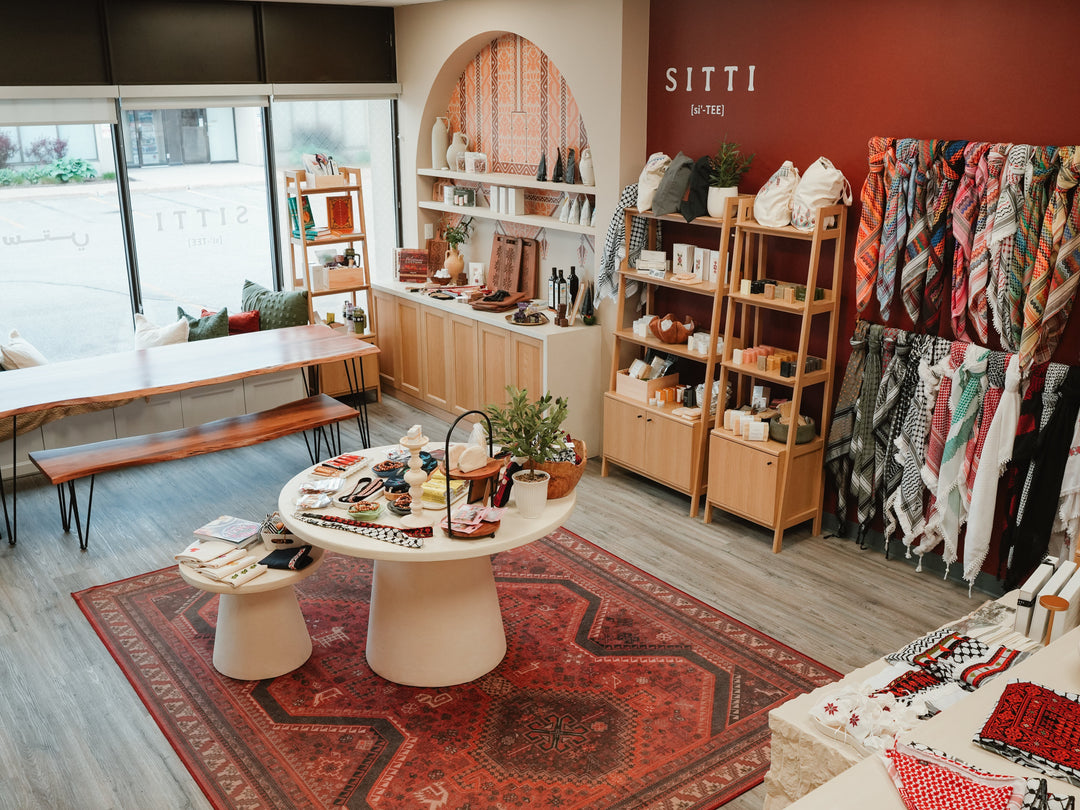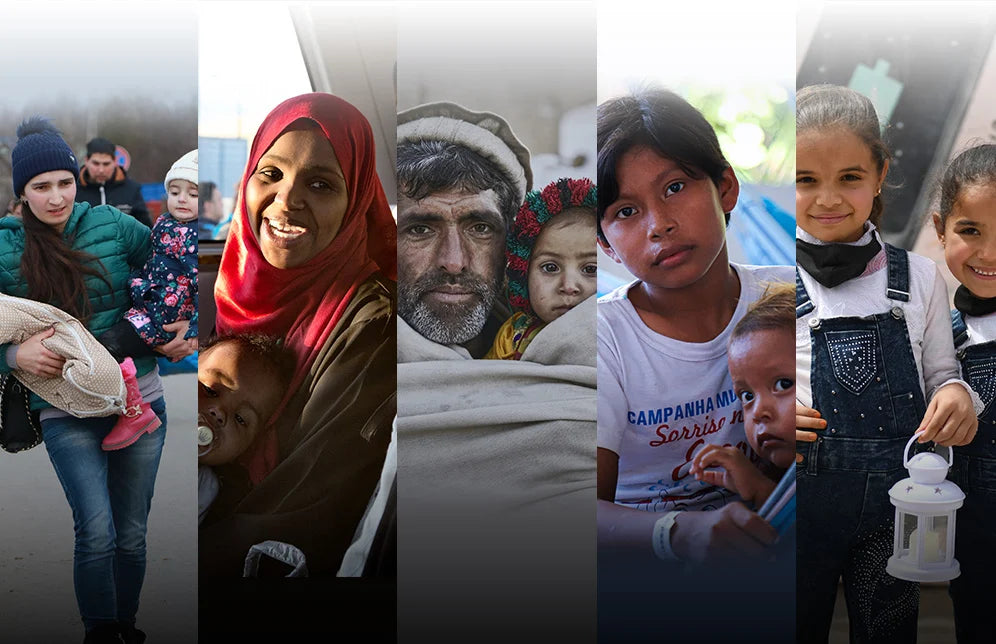What Does “Work-Life Balance” Mean if You’re Displaced?

Earlier this spring, we had a rejuvenating wellness retreat with our Hopes-Sitti team and movement coach, Shireen Khamees. This and the learnings from our 2020 Impact Report got us talking a lot about keeping our health in-check and managing stress.
Dealing with work-related pressure is a common issue, and finding the right balance between our job duties and other life activities can be challenging. When we search “work-life balance”, we find plenty of resources offering help or advice to the average person. However, there are few that address this problem for a displaced person. Therefore, we decided to create our own “How-To” list of work-life balance strategies for the displaced community.

In order for your body to function well, you need to consume a regular, healthy intake of food. This is not an easy habit to maintain for displaced communities. In many cases, they don’t have physical and economic access to sufficient and sustainable food supplies to meet their dietary needs and lead a healthy and productive life.
Food insecurity is one of the results of displacement. There is a clear link between nutrition and public health. Right now, over 821 million people in the world are hungry. And it’s estimated that an additional 2 billion people will be undernourished by 2050. According to the UNHCR, Mass population movements can result in high rates of malnutrition, sickness and death.
Sustainable agriculture is a long-term solution, which is effective in reducing poverty and improving food security in a community. Displacement lasts 20 years on average for refugees and more than 10 years for most Internally Displaced Persons (IDPS). Therefore, sustainable agriculture is a more and more realistic option for addressing hunger in these communities.
In the event of global emergencies, like COVID-19, there is also a need for urgent responses to food shortages. In Jordan, the World Food Programme (WFP) provides food assistance to vulnerable communities, including refugees, by using innovative technologies like blockchain and iris scanners to give refugees living inside camps access to the assistance, while refugees living outside of camps use ATMs to withdraw cash or use e-cards at one of the 200 contracted shops across the country.
Exercise is another vital tool to keep your body fit. It is necessary especially for displaced people. According to UNHCR, structured recreational activities, such as team sports, are an important step in rebuilding a destroyed society and boosting the healing process of any existing trauma.
UNHCR and its partners work through organized sports activities to promote the participation of displaced populations and stateless people. UNHCR also supports refugee-led organizations to promote peaceful co-existence with host communities through the medium of sport.
Finally, sleeping is also essential for good health. A displaced person is more likely to suffer from disordered sleeping. Traumatic events are presumed to cause sleep disturbances, and stress is one of the main contributors to sleeping disorders. According to WHO, one way to relieve stress is to do something fun or relaxing during the day, like reading, listening to music, singing, or just resting, or any other activity that the person prefers.

In Jordan’s Palestinian refugee community as an example, approximately 70% of camp and outside-camp refugees work 50 hours or more per week.This state of job instability and consistently long hours gradually blurs the line between work and home. It became even a more serious problem during the pandemic, which has hit the informal sector, where many are forced to make a living.
Displaced people are encouraged to arm themselves with the available information about employment in their host country. This info can be found for example on the UNHCR. It’s also worth trying to check the available employment or skills development programs that humanitarian organizations usually offer. For instance, Sitti’s CBO partner, Hopes for Women in Education (“Hopes for Women”), is a non-profit that provides scholarship opportunities and professional development services to motivated Palestinian refugee girls and women throughout Jordan, including Jerash Camp.
Get Involved in Your Community

Volunteering and community involvement can give a healthy boost to our self-confidence, sense of achievement, and life satisfaction. Vulnerable and displaced communities are known to have a strong support system within their community, especially through the form of community-based organizations (CBOs). Sonia Ben Ali, the Co-Founder and CEO of Urban Refugees says: “These groups know their communities best and are often those who respond first to their communities’ needs and priorities.”
Whether it’s looking out for people's needs around us, or volunteering in social campaigns, Being part of our community serves many purposes at the same time, helping us to realize we are not alone.

Usually, experts advise people to pay attention to their physical and mental health, and seek professional help when needed, but in displaced communities, professional help is not as accessible. People in these communities compromise their health.
In our Sips with Sitti episode about “Taking Our Health Into Our Hands”, holistic coach and movement teacher Shireen Khamees discussed how taking the time to pay attention to our bodies helps relieve pain:
“We live in a society where we’re so cut-off from our body. Sometimes when you’re very anxious you even feel you’re not in your body anymore. So, when we do these sort of in-body practices, we’re directing all the energy back down into the earth, so it goes back to your body.”
In particular, women are known to sideline their well-being and put their family needs first. Women who are the primary or sole income-earners can also experience greater stress when it comes to income. According to Phase 1 of the Sitti Self-Reliance Index (SRI) Survey, lower Household and Food self-reliance scores were documented for Hopes for Women participants than Rehabilitation Centre participants overall. Based on insight from our team members in-the-field and external research, Sitti concludes that female-headed and single-income households are experiencing a disproportionate amount of stress
With support from GIZ Jordan Sitti has begun responding with psychosocial group support sessions, as well as a pilot Wellness Retreat for the Hopes-Sitti team.
GIZ is one organization that is working to address the psychosocial needs of displaced communities, by working in cooperation with state and civil society agencies in Germany and in the local region. They create projects that improve psychosocial support for refugees and internally displaced persons (IDPs) in the Middle East.

Image: Sitti team in the Jerash Camp, Jordan. Photo by Amna.

About the Author: Hazar Najjar is the Communications Assistant for Sitti Social Enterprise. She is originally from Syria and has a background in journalism and humanitarian work.
Want to know more about how Sitti is responding to our community’s needs? Check out Sitti’s 2020 Impact Report and go to the section titled, “Self Reliance Index (SRI)” to read more (p. 50-59).
Arabic version:
العنوان: كيف يمكن تحقيق التوازن بين العمل والحياة إذا كنت مهجّر/نازح؟
قبل عدة أشهر خلال فصل الربيع، قمنا بتنظيم منتجع صحي مع فريق Hopes-Sitti بالتنسيق مع مدربة الحركة شيرين خميس. تجربة المنتج الصحي لفريقنا في الأردن بالإضافة إلى بعض الحقائق التي توصلنا إليها من خلال تقرير التأثير لعام ٢٠٢٠، أدوا إلى زيادة تركيزنا على ضرورة الإعتناء بالصحة ومعالجة حالات التوتر.
يعد التعامل مع ضغوطات العمل مشكلة شائعة لدى الكثير من الناس، فإيجاد التوازن الصحيح بين واجباتنا الوظيفية وأنشطة الحياة الأخرى ليس سهلاً. عندما نبحث في الإنترنت عن طرق لتحقيق "التوازن بين العمل والحياة"، نجد الكثير من المصادر التي تقدم المساعدة أو المشورة. ولكن المصادر التي تتطرق لهذه المشكلة عند للمُهَجَّرين/ نازحين قليلة. و لذلك، قررنا إنشاء قائمة "الإرشادات" الخاصة بنا لتحقيق استراتيجيات التوازن بين العمل والحياة في مجتمع المُهَجَّرين/ النازحين.
تحتاج لتناول طعام صحي ومنتظم لكي يعمل جسمك بشكل جيد، وهذه ليست عادة يسهل العمل بها في مجتمعات المُهَجَّرين/ النازحين. ففي كثير من الحالات، لا تتمتع هذه الشريحة من المجتمع بإمكانية الوصول الاقتصادي أو اللوجستي إلى الإمدادات الغذائية الكافية والمستدامة لتلبية احتياجاتهم الغذائية وعيش حياة صحية ومنتجة.
إن انعدام الأمن الغذائي هو أحد النتائج الطبيعية للنزوح، وهنالك ارتباط وثيق بين التغذية والصحة العامة. ففي الوقت الحالي، يعاني أكثر من 821 مليون شخص في العالم من الجوع، وتشير التقديرات إلى أن ملياري شخص آخرين سيعانون من نقص التغذية بحلول عام 2050، وفقًا لمفوضية الأمم المتحدة لشؤون اللاجئين. كمان أنه من المتعارف عليه أن تؤدي التحركات السكانية الجماعية إلى ارتفاع معدلات سوء التغذية والمرض وحالات الوفاة.
تُعدُ الزراعة المستدامة حلًا فعّالًا وطويل الأجل للحد من الفقر وتحسين الأمن الغذائي في المجتمع. إن متوسط حالة النزوح للاجئين هي 20 عامًا، بينما هي أكثر من 10 سنوات لمعظم الأشخاص النازحين داخليًا (IDPS). لذلك، تعد الزراعة المستدامة خيارًا أكثر واقعية للتصدي للجوع في هذه المجتمعات.
في حالات الطوارئ العالمية، مثل وباء كوفيد -19، هناك أيضًا حاجة إلى استجابات عاجلة لنقص الغذاء. في الأردن على سبيل المثال، يقدم برنامج الغذاء العالمي (WFP) المساعدة الغذائية للمجتمعات الضعيفة التي تحتاج الدعم، بما في ذلك اللاجئين، وذلك باستخدام تقنيات مبتكرة مثل قواعد البيانات المتسلسلة وماسح قزحية العين، لمنح اللاجئين الذين يعيشون داخل المخيمات إمكانية الوصول إلى المساعدات. بينما يستخدم اللاجئون الذين يعيشون خارج المخيمات أجهزة الصراف الآلي لسحب المبالغ النقدية، أو البطاقات الإلكترونية في واحد من 200 متجر متعاقد معها في جميع أنحاء البلاد.
الرياضة هي أداة حيوية أخرى للحفاظ على لياقة جسمك. فهي ضرورية بشكل عام لكل الناس وبشكل خاص المُهَجَّرين/ النازحين. وفقًا لمفوضية اللاجئين، تعد الأنشطة الترفيهية المنظمة مثل الرياضات الجماعية، خطوة مهمة في إعادة بناء مجتمع مدمر وتعزيز عملية الشفاء من أي صدمة موجودة.
تعمل المفوضية وشركاؤها من خلال الأنشطة الرياضية المنظمة لتعزيز مشاركة السكان النازحين. كما تدعم المفوضية المنظمات التي يقودها اللاجئون لتعزيز التعايش السلمي مع المجتمعات المضيفة من خلال الرياضة.
وأخيرًا، النوم ضروري أيضًا لصحة جيدة. من المرجح أن يعاني الشخص النازح من اضطراب النوم مقارنة مع شخص آخر يعيش حياة اعتيادية. فالأحداث الصادمة تسبب اضطرابات النوم، كما أن الإجهاد هو أحد المسببات الرئيسية لها. وفقًا لمنظمة الصحة العالمية، تتمثل إحدى طرق تخفيف التوتر في القيام بشيء ممتع أو الاسترخاء خلال اليوم، مثل القراءة أو الاستماع إلى الموسيقى أو الغناء أو مجرد الراحة أو أي نشاط آخر يفضله الشخص.
من الصعب على المُهَجَّرين/ النازحين تحديد جدول عمل واضح، وغالبًا ما يكون سبب ذلك هو مكافحة هذه الشريحة للاندماج في سوق العمل في البلد أو المدينة المضيفة. ونتيجة لذلك، فإنهم يتمسكون بأي فرصة عمل يحصلون عليها، حتى لو كان ذلك يعني العمل لأكثر من 7-8 ساعات في اليوم.
في مجتمع اللاجئين الفلسطينيين في الأردن على سبيل المثال، يعمل 70٪ تقريبًا من اللاجئين في المخيمات وخارج المخيمات 50 ساعة أو أكثر في الأسبوع. تؤدي حالة عدم الاستقرار الوظيفي وساعات العمل الطويلة باستمرار إلى طمس الخط الفاصل بين العمل والمنزل. وقد تفاقمت هذه المشكلة خلال فترة الجائحة، التي ضربت القطاع غير الرسمي، حيث يلجأ له الكثيرون لكسب لقمة العيش.
يُنصح المُهَجَّرين/ النازحين بتسليح أنفسهم بالمعلومات المتوفرة حول التوظيف في البلد المضيف. و يمكن العثور على هذه المعلومات على سبيل المثال على موقع مفوضية الأمم المتحدة لشؤون اللاجئين. كما يجب أيضًا محاولة التحقق من فرص العمل المتاحة أو برامج تنمية المهارات التي تقدمها المنظمات الإنسانية عادةً. فعلى سبيل المثال، تعتبر شريكة Sitti، مؤسسة آمال لتدريب وتعليم الفتيات منظمة غير ربحية توفر فرصًا للمنح الدراسية وخدمات التطوير المهني للفتيات والنساء اللاجئات الفلسطينيات في جميع أنحاء الأردن، بما في ذلك مخيم جرش.
يساهم العمل التطوعي والمشاركة المجتمعية في تعزيز ثقتنا بأنفسنا، وإعطائنا الشعور بالإنجاز والرضا عن حياتنا. و من المعروف أن المجتمعات الضعيفة والمهجرة لديها نظام دعم قوي داخل مجتمعها، لا سيما من خلال شكل المنظمات المجتمعية المحلية (CBOs). تقول سونيا بن علي، المؤسسة المشاركة والرئيسة التنفيذية لشركة Urban Refugees: "هذه المجموعات تعرف مجتمعاتها بشكل أفضل وغالبًا ما تكون تلك المجموعات أول المستجيبين لإحتياجات مجتمعاتهم وأولوياتها".
سواء تعلق الأمر بالبحث عن احتياجات الأشخاص من حولنا، أو التطوع في الحملات الاجتماعية، فإن كونك جزءًا من مجتمعك يخدم العديد من الأغراض في نفس الوقت، و يساعدنا على إدراك أننا لسنا وحدنا.
عادةً ينصح الخبراء الناس بالاهتمام بصحتهم الجسدية والعقلية، وعدم التردد بطلب مساعدة أخصائي عند الحاجة، أما في مجتمعات المُهَجَّرين/ النازحين فلا تتوفر إمكانية الوصول إلى مساعدة الأخصائيين النفسيين، فتضحي أو تتنازل هذه الشريحة من المجتمع بصحتها في سبيل أمور أكثر أهمية بالنسبة لها.
في آخر حلقة أجريناها من برنامج Sips with Sitti حول موضوع الإعتناء بالصحة، ناقشت المدربة شيرين خميس دور التركيز على أجسادنا في تخفيف الألم:
"نحن نعيش في مجتمع يعمل على عزلنا عن أجسادنا. في بعض الأحيان عندما تكون قلقًا جدًا، تشعر أنك لم تعد في جسدك. لذلك، عندما نقوم بهذا النوع من التأملات داخل الجسم، فإننا نوجه كل الطاقة مرة أخرى إلى الأرض، لتعود إلى جسدك".
من المعروف أن المرأة تهمش صحتها لتضع احتياجات أسرتها في المقام الأول. كما يمكن أن تتعرض النساء اللاتي يكسبن الدخل الأساسي أو الوحيد في المنزل إلى درجات أعلى من الضغط والتوتر. وفقًا للمرحلة الأولى من استبيان دراسة مؤشر الإعتماد على الذات الذي أجريناه في Sitti، تم توثيق درجات أقل للاعتماد على الذات للمشاركين من "مؤسسة آمال لتدريب وتعليم الفتيات" مقارنة بالمشاركين في مركز التأهيل المجتمعي بشكل عام. وبناءً على تقديرات أعضاء فريقنا في الميدان بالإضافة إلى البحوث الخارجية توصلّنا إلى نتيجة أن الأسر التي تعولها امرأة، من دون وجود مصدر آخر للدخل، تعاني بشكل أكبر من الإجهاد.
وبدعم من GIZ Jordan ، بدأت Sitti في الاستجابة لهذه الحاجة من خلال جلسات دعم جماعي نفسي واجتماعي، بالإضافة إلى برنامج Wellness Retreat لفريق Hopes-Sitti. .

GIZ هي إحدى المنظمات التي تعمل على تلبية الاحتياجات النفسية والاجتماعية للمجتمعات النازحة، من خلال العمل بالتعاون مع منظمات دولية في ألمانيا ومحلية في المنطقة، بحيث يعملون على إنشاء مشاريع تعمل على تحسين الدعم النفسي والاجتماعي للاجئين والنازحين داخليًا في الشرق الأوسط.
هل تريد معرفة المزيد حول كيفية استجابة Sitti لإحتياجات مجتمعنا؟ أنظر تقرير تأثير Sitti لعام 2020 وانتقل إلى القسم المعنون "مؤشر الاعتماد على الذات (SRI)" لقراءة المزيد (ص 50-59).





Leave a comment